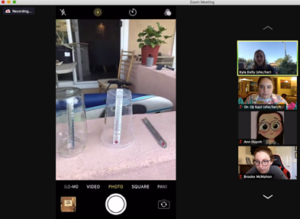 Climate Change Professional Development for Teachers
Climate Change Professional Development for Teachers
The USC Joint Educational Project’s STEM Education Programs hosted a climate change professional development (PD) for elementary school educators on Saturday October 17th, 2020. The virtual PD workshop covered elementary lesson plans that could be incorporated in digital and in-person classrooms and featured hands-on, inquiry-based and interdisciplinary activities with math and literacy components. The lessons covered how to introduce students to climate change using at-home-friendly supplies, like glass and plastic cups and thermometers, and how to collect data related to climate change for their classrooms.
To assist with data collection, JEP’s STEM Education Programs purchased seven CO2 sensors to install in each of our seven Los Angeles Unified School District (LAUSD) partner schools. Once in-person learning resumes, these sensors will be placed in various locations around schools, including classrooms, outside near the car drop-off area, and in large community spaces such as the cafeteria. Students will use these sensors to measure atmospheric CO2 levels at the local level. Classrooms will be responsible for monitoring and recording sensor CO2 levels daily, and the data from each sensor will be compiled and collectively analyzed with the help of researchers from the USC’s Earth Sciences, and Marine and Environmental Biology departments.

The workshop provided helpful resources to the teachers in attendance, eighty percent of whom reported that they were “extremely likely” to teach one or more of the lessons to their students, facilitating further elementary education on greenhouse gas emissions. Elaine Krebs, a informal science educator from the California Science Center, remarked: “This workshop provided useful experiments and conversation starters for my students that will get them thinking about how they can make a difference on climate change on both a global and local scale.” Another teacher commented: “The lessons in this workshop are simple to implement and capitalize on an issue relevant to schools, teachers, and students”.
JEP’s STEM Education Programs partnered with the USC Rossier School of Education to offer Continuing Education Units (CEU) to participating teachers. Funding for the project was provided by the North American Association for Environmental Education (NAAEE).